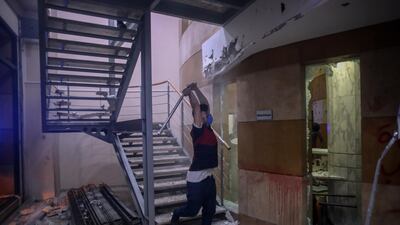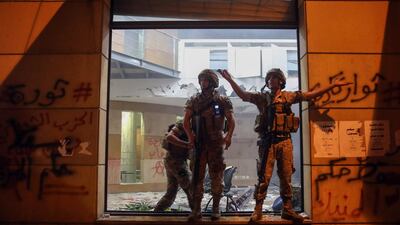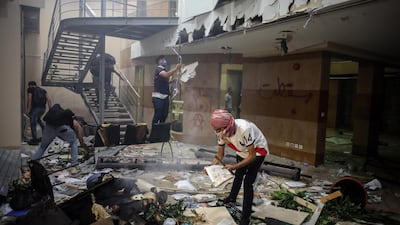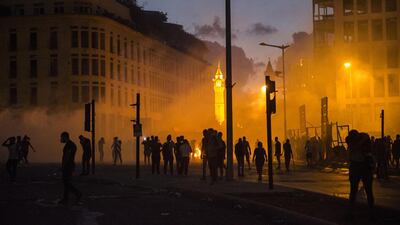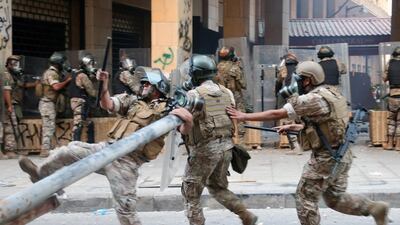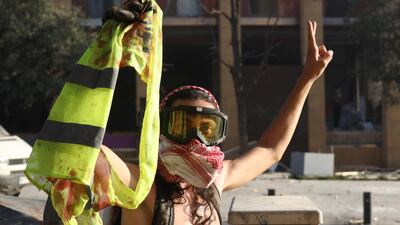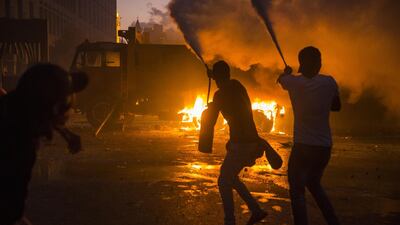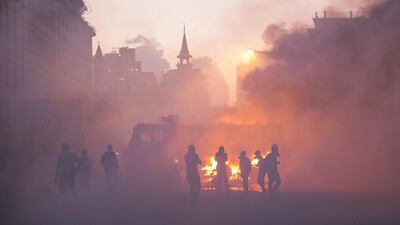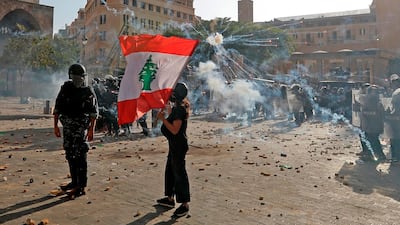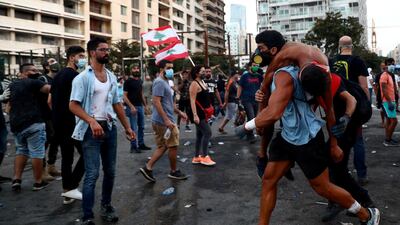The head of the UN food agency said on Monday that he is “very, very concerned” Lebanon could run out of bread in about 2 and a half weeks because 85 per cent of the country’s grain comes through Beirut’s devastated port – but he believes an area of the port can be made operational this month.
David Beasley, who is in Beirut assessing damage and recovery prospects, told a virtual UN briefing on the humanitarian situation following last week’s explosion in the Lebanese capital that “at the devastated site, we found a footprint that we can operate on a temporary basis.”
“Working with the Lebanese army, we believe that we can clear part of that site,” Mr Beasley said. “We’ll be airlifting in a lot of equipment, doing everything we can.”
Mr Beasley said he had met with Cabinet ministers – who all resigned later on Monday – and told them the UN needs “absolute co-operation now, no obstacles” because people on the streets are angry and said they need international help but “please make certain that the aid comes directly to the people.”
For the first time since last week’s blast, two ships docked at Beirut’s port on Monday including one carrying grain, according to state media.
The head of the workers union at the port, Bechara Asmar told Al Jadeed TV that since the grain silos were destroyed by the explosion, the material will be pumped directly to trucks or bags after being sanitised.
“This is a glimmer of hope,” Mr Asmar said about the first arrivals adding that the port’s fifth basin where the ships docked remains intact despite the blast.
Mr Beasley, the executive director of the World Food Programme, said a ship with 17,500 metric tons of wheat flour should arrive in Beirut “within two weeks, and that’s to put bread on the table of all the people of Lebanon and that will give us a bread supply for 20 days.”
“While we’re doing that, we’ve got a 30-day supply of about 30,000 metric tons of wheat that we’re bringing in, and then another 100,000 metric tons over the next 60 days after that,” Mr Beasley said.
Najat Rochdi, the UN humanitarian co-ordinator for Lebanon, told a press conference after briefing UN members that Beasley went to the port with engineers to assess what can be done.
“They are very optimistic to start actually this rehabilitation as soon as this week to increase the capacity of the port of Beirut,” she said.
Ms Rochdi said she understands a ship will be arriving Thursday with some construction material, followed by a ship with wheat and grain, “to address the issue of food security and to hopefully make sure Beirut is not going to be short of bread.”
UN humanitarian chief Mark Lowcock told diplomats the “swift and wide-ranging” humanitarian response is just the first of a three-phased response to the tragedy.
“The second – recovery and reconstruction – will cost billions of dollars and require a mix of public and private finance,” he said. "The third element is responding to the Lebanon’s pre-existing socioeconomic crisis which is already exacerbated by Covid-19.”
Mr Lowcock, the undersecretary-general for humanitarian affairs and emergency relief co-ordinator, stressed the Beirut explosion last Tuesday “will have repercussions far beyond those we see in front of us now.”
He urged donors, international financial institutions and the wider international community to “come together and put their shoulder to the wheel,” stressing that the Lebanese people will be served best by a collective response.
UN Secretary-General Antonio Guterres told UN member nations the voices of Lebanon’s angry people “must be heard.”
“It is important that a credible and transparent investigation determine the cause of the explosion and bring about the accountability demanded by the Lebanese people,” he said.
“It is also important that reforms be implemented so as to address the needs of the Lebanese people for the longer term.”
Mr Guterres also pledged that “the United Nations will stand with Lebanon to help alleviate the immediate suffering and support its recovery.”
The Sand Castle
Director: Matty Brown
Stars: Nadine Labaki, Ziad Bakri, Zain Al Rafeea, Riman Al Rafeea
Rating: 2.5/5
UAE%20medallists%20at%20Asian%20Games%202023
%3Cp%3E%3Cstrong%3EGold%3C%2Fstrong%3E%0D%3Cbr%3EMagomedomar%20Magomedomarov%20%E2%80%93%20Judo%20%E2%80%93%20Men%E2%80%99s%20%2B100kg%0D%3Cbr%3EKhaled%20Al%20Shehi%20%E2%80%93%20Jiu-jitsu%20%E2%80%93%20Men%E2%80%99s%20-62kg%0D%3Cbr%3EFaisal%20Al%20Ketbi%20%E2%80%93%20Jiu-jitsu%20%E2%80%93%20Men%E2%80%99s%20-85kg%0D%3Cbr%3EAsma%20Al%20Hosani%20%E2%80%93%20Jiu-jitsu%20%E2%80%93%20Women%E2%80%99s%20-52kg%0D%3Cbr%3EShamma%20Al%20Kalbani%20%E2%80%93%20Jiu-jitsu%20%E2%80%93%20Women%E2%80%99s%20-63kg%0D%3Cbr%3E%3Cstrong%3ESilver%3C%2Fstrong%3E%0D%3Cbr%3EOmar%20Al%20Marzooqi%20%E2%80%93%20Equestrian%20%E2%80%93%20Individual%20showjumping%0D%3Cbr%3EBishrelt%20Khorloodoi%20%E2%80%93%20Judo%20%E2%80%93%20Women%E2%80%99s%20-52kg%0D%3Cbr%3EKhalid%20Al%20Blooshi%20%E2%80%93%20Jiu-jitsu%20%E2%80%93%20Men%E2%80%99s%20-62kg%0D%3Cbr%3EMohamed%20Al%20Suwaidi%20%E2%80%93%20Jiu-jitsu%20%E2%80%93%20Men%E2%80%99s%20-69kg%0D%3Cbr%3EBalqees%20Abdulla%20%E2%80%93%20Jiu-jitsu%20%E2%80%93%20Women%E2%80%99s%20-48kg%0D%3Cbr%3E%3Cstrong%3EBronze%3C%2Fstrong%3E%0D%3Cbr%3EHawraa%20Alajmi%20%E2%80%93%20Karate%20%E2%80%93%20Women%E2%80%99s%20kumite%20-50kg%0D%3Cbr%3EAhmed%20Al%20Mansoori%20%E2%80%93%20Cycling%20%E2%80%93%20Men%E2%80%99s%20omnium%0D%3Cbr%3EAbdullah%20Al%20Marri%20%E2%80%93%20Equestrian%20%E2%80%93%20Individual%20showjumping%0D%3Cbr%3ETeam%20UAE%20%E2%80%93%20Equestrian%20%E2%80%93%20Team%20showjumping%0D%3Cbr%3EDzhafar%20Kostoev%20%E2%80%93%20Judo%20%E2%80%93%20Men%E2%80%99s%20-100kg%0D%3Cbr%3ENarmandakh%20Bayanmunkh%20%E2%80%93%20Judo%20%E2%80%93%20Men%E2%80%99s%20-66kg%0D%3Cbr%3EGrigorian%20Aram%20%E2%80%93%20Judo%20%E2%80%93%20Men%E2%80%99s%20-90kg%0D%3Cbr%3EMahdi%20Al%20Awlaqi%20%E2%80%93%20Jiu-jitsu%20%E2%80%93%20Men%E2%80%99s%20-77kg%0D%3Cbr%3ESaeed%20Al%20Kubaisi%20%E2%80%93%20Jiu-jitsu%20%E2%80%93%20Men%E2%80%99s%20-85kg%0D%3Cbr%3EShamsa%20Al%20Ameri%20%E2%80%93%20Jiu-jitsu%20%E2%80%93%20Women%E2%80%99s%20-57kg%0D%3C%2Fp%3E%0A
UAE currency: the story behind the money in your pockets
Honeymoonish
%3Cp%3E%3Cstrong%3EDirector%3A%3C%2Fstrong%3E%20Elie%20El%20Samaan%3C%2Fp%3E%0A%3Cp%3E%3Cstrong%3EStarring%3A%20%3C%2Fstrong%3ENour%20Al%20Ghandour%2C%20Mahmoud%20Boushahri%3C%2Fp%3E%0A%3Cp%3E%3Cstrong%3ERating%3A%3C%2Fstrong%3E%203%2F5%3C%2Fp%3E%0A
UAE currency: the story behind the money in your pockets
HER%20FIRST%20PALESTINIAN
%3Cp%3EAuthor%3A%20Saeed%20Teebi%3C%2Fp%3E%0A%3Cp%3EPages%3A%20256%3C%2Fp%3E%0A%3Cp%3EPublisher%3A%C2%A0House%20of%20Anansi%20Press%3C%2Fp%3E%0A
MATCH INFO
What: 2006 World Cup quarter-final
When: July 1
Where: Gelsenkirchen Stadium, Gelsenkirchen, Germany
Result:
England 0 Portugal 0
(Portugal win 3-1 on penalties)
The specs
Engine: 2.9-litre twin-turbo V6
Power: 540hp at 6,500rpm
Torque: 600Nm at 2,500rpm
Transmission: Eight-speed auto
Kerb weight: 1580kg
Price: From Dh750k
On sale: via special order
Election pledges on migration
CDU: "Now is the time to control the German borders and enforce strict border rejections"
SPD: "Border closures and blanket rejections at internal borders contradict the spirit of a common area of freedom"
The Vile
Starring: Bdoor Mohammad, Jasem Alkharraz, Iman Tarik, Sarah Taibah
Director: Majid Al Ansari
Rating: 4/5
WandaVision
Starring: Elizabeth Olsen, Paul Bettany
Directed by: Matt Shakman
Rating: Four stars
Groom and Two Brides
Director: Elie Semaan
Starring: Abdullah Boushehri, Laila Abdallah, Lulwa Almulla
Rating: 3/5
If you go
- The nearest international airport to the start of the Chuysky Trakt is in Novosibirsk. Emirates (www.emirates.com) offer codeshare flights with S7 Airlines (www.s7.ru) via Moscow for US$5,300 (Dh19,467) return including taxes. Cheaper flights are available on Flydubai and Air Astana or Aeroflot combination, flying via Astana in Kazakhstan or Moscow. Economy class tickets are available for US$650 (Dh2,400).
- The Double Tree by Hilton in Novosibirsk ( 7 383 2230100,) has double rooms from US$60 (Dh220). You can rent cabins at camp grounds or rooms in guesthouses in the towns for around US$25 (Dh90).
- The transport Minibuses run along the Chuysky Trakt but if you want to stop for sightseeing, hire a taxi from Gorno-Altaisk for about US$100 (Dh360) a day. Take a Russian phrasebook or download a translation app. Tour companies such as Altair-Tour ( 7 383 2125115 ) offer hiking and adventure packages.
Medicus AI
Started: 2016
Founder(s): Dr Baher Al Hakim, Dr Nadine Nehme and Makram Saleh
Based: Vienna, Austria; started in Dubai
Sector: Health Tech
Staff: 119
Funding: €7.7 million (Dh31m)
RACE CARD AND SELECTIONS
5pm: Maiden (PA) Dh80,000 1,200m
5,30pm: Wathba Stallions Cup Handicap (PA) Dh70,000 1,200m
6pm: The President’s Cup Listed (TB) Dh380,000 1,400m
6.30pm: The President’s Cup Group One (PA) Dh2,500,000 2,200m
7pm: Arabian Triple Crown Listed (PA) Dh230,000 1,600m
7.30pm: Handicap (PA) Dh80,000 1,400m
The National selections
5pm: RB Hot Spot
5.30pm: Dahess D’Arabie
6pm: Taamol
6.30pm: Rmmas
7pm: RB Seqondtonone
7.30pm: AF Mouthirah
The Pope's itinerary
Sunday, February 3, 2019 - Rome to Abu Dhabi
1pm: departure by plane from Rome / Fiumicino to Abu Dhabi
10pm: arrival at Abu Dhabi Presidential Airport
Monday, February 4
12pm: welcome ceremony at the main entrance of the Presidential Palace
12.20pm: visit Abu Dhabi Crown Prince at Presidential Palace
5pm: private meeting with Muslim Council of Elders at Sheikh Zayed Grand Mosque
6.10pm: Inter-religious in the Founder's Memorial
Tuesday, February 5 - Abu Dhabi to Rome
9.15am: private visit to undisclosed cathedral
10.30am: public mass at Zayed Sports City – with a homily by Pope Francis
12.40pm: farewell at Abu Dhabi Presidential Airport
1pm: departure by plane to Rome
5pm: arrival at the Rome / Ciampino International Airport
2025 Fifa Club World Cup groups
Group A: Palmeiras, Porto, Al Ahly, Inter Miami.
Group B: Paris Saint-Germain, Atletico Madrid, Botafogo, Seattle.
Group C: Bayern Munich, Auckland City, Boca Juniors, Benfica.
Group D: Flamengo, ES Tunis, Chelsea, Leon.
Group E: River Plate, Urawa, Monterrey, Inter Milan.
Group F: Fluminense, Borussia Dortmund, Ulsan, Mamelodi Sundowns.
Group G: Manchester City, Wydad, Al Ain, Juventus.
Group H: Real Madrid, Al Hilal, Pachuca, Salzburg.
if you go
The flights
Fly direct to Kutaisi with Flydubai from Dh925 return, including taxes. The flight takes 3.5 hours. From there, Svaneti is a four-hour drive. The driving time from Tbilisi is eight hours.
The trip
The cost of the Svaneti trip is US$2,000 (Dh7,345) for 10 days, including food, guiding, accommodation and transfers from and to Tbilisi or Kutaisi. This summer the TCT is also offering a 5-day hike in Armenia for $1,200 (Dh4,407) per person. For further information, visit www.transcaucasiantrail.org/en/hike/
GIANT REVIEW
Starring: Amir El-Masry, Pierce Brosnan
Director: Athale
Rating: 4/5

